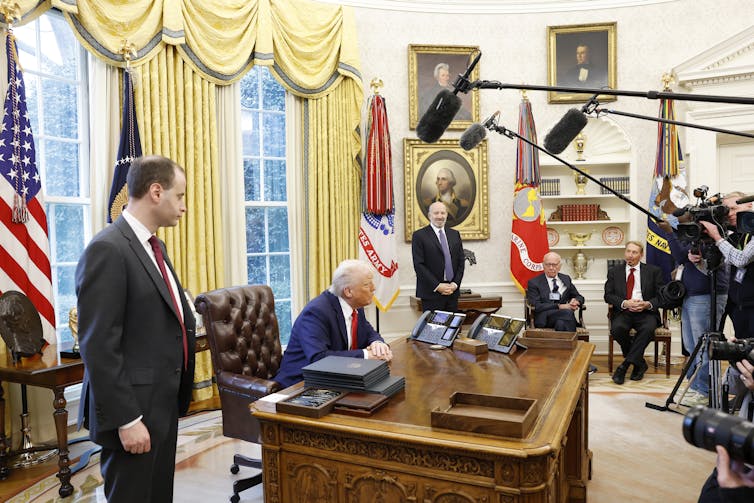Andrew Dodd, The University of Melbourne and Matthew Ricketson, Deakin University
If Rupert Murdoch becomes a white knight standing up to a rampantly bullying US president, the world has moved into the upside-down.
This is, after all, the media mogul whose US television network, Fox News, actively supported Donald Trump’s Big Lie about the 2020 presidential election result and paid out a US$787 million (about A$1.2 billion) lawsuit for doing so.
It is also the network that supplied several members of Trump’s inner circle, including former Fox host, now controversial Defense Secretary, Pete Hegseth.
But that is where we are after Trump filed a writ on July 18 after Murdoch’s financial newspaper, The Wall Street Journal, published an article about a hand-drawn card Trump is alleged to have sent to sex offender Jeffrey Epstein in 2003. The newspaper reported:
A pair of small arcs denotes the woman’s breasts, and the future president’s signature is a squiggly “Donald” below her waist, mimicking pubic hair.
The Journal said it has seen the letter but did not republish it. The letter allegedly concluded:
Happy Birthday – and may every day be another wonderful secret.
The card was apparently Trump’s contribution to a birthday album compiled for Epstein by the latter’s partner Ghislaine Maxwell, who is serving a 20-year sentence after being found guilty of sex trafficking in 2021.
Trump was furious. He told his Truth Social audience he had warned Murdoch the letter was fake. He wrote, “Mr Murdoch stated that he would take care of it but obviously did not have the power to do so,” referring to Murdoch handing leadership of News Corporation to his eldest son Lachlan in 2023.
Trump is being pincered. On one side, The Wall Street Journal is a respected newspaper that speaks to literate, wealthy Americans who remain deeply sceptical about Trump’s radical initiative on tariffs, which it described in an editorial as “the dumbest trade war in history”.
On the other side is the conspiracy theory-thirsty MAGA base who have been told for years that there was a massive conspiracy around Epstein’s apparent suicide in 2019 that included the so-called deep state, Democrat elites and, no doubt, the Clintons.
Trump, who loves pro wrestling as well as adopting its garish theatrics, might characterise his lawsuit against Murdoch as a smackdown to rival Hulk Hogan vs Andre the Giant in the 1980s.
To adopt wrestling argot, though, it is a rare battle between two heels.
A friendship of powerful convenience
Murdoch and Trump’s relationship is longstanding but convoluted. The key to understanding it is that both men are ruthlessly transactional.
Exposure in Murdoch’s New York Post in the 1980s and ‘90s was crucial to building Trump’s reputation.
Not that Murdoch particularly likes Trump. Yes, Murdoch attended his second inauguration, albeit in a back row behind the newly favoured big tech media moguls. He was also seen sitting in the Oval Office a few days later looking quite at home.
But this was pure power-display politics, not the behaviour of a friend.


Anna Moneymaker/Getty
Remember Murdoch’s derision on hearing Trump was considering standing for office before the 2016 election, and his promotion of Ron De Santis in the primaries before Trump’s second term. Murdoch’s political hero has always been Ronald Reagan. Trump has laid waste to the Republican Party of Reagan.
Murdoch knows what the rest of sane America knows: Trump is downright weird, if not dangerous. This, of course, only makes Murdoch’s complicity in Trump’s rise to power, and Fox News’ continued boosterism of Trump, all the more appalling.
But, in keeping with Murdoch’s relationship to power throughout his career, what he helps make, he also helps destroy. Perhaps now it’s Trump’s turn to be unmade. As a former Murdoch lieutenant told The Financial Times over the weekend:
he’s testing out: Is Trump losing his base? And where do I need to be to stay in the heart of the base?
And here is Murdoch’s great advantage, and his looming threat.
A double-edged sword
The advantage comes with the scope of Murdoch’s media empire, which operates like a federation of different mastheads, each with their own market and aspirations. While Fox News panders to the MAGA base, and The New York Post juices its New York audience, The Wall Street Journal speaks, and listens, to business. Each audience has different needs, meaning they’re often presented with the same news in very different ways, or sometimes different news entirely.
Like a federation, though, News Corp uses its various operations to drive the type of change that affects all its markets.
It might work like this. The Wall Street Journal breaks a story that’s so shocking it begins to chip away at MAGA’s unquestioning loyalty of Trump. This process is, of course, willingly aided by the rest of the media. The resulting groundswell eventually allows Fox News and the Post to tentatively follow their audiences into questioning, and then perhaps criticising, Trump.


NurPhoto/Getty
The threat is that before that groundswell builds, Murdoch is seriously vulnerable to criticism from a still dominant Trump, who can turn conspiracy-prone audiences away from Fox News with just a social media post. Trump has already been busy doing just that, saying he is looking forward to getting Murdoch onto the witness stand for his lawsuit.
If the Fox audience decides it’s the proprietor who’s behind this denigration of Trump, they may decide to boycott their own favoured media channel, even though Fox’s programming hasn’t yet started questioning Trump.
The Murdochs’ fear of audience backlash was a major factor in Fox’s promulgation of the Big Lie after Trump’s defeat in 2020. The fear their audience might defect to Newsmax or some other right-wing media outfit is just as real today.
History littered with fakery
We also need to consider that Trump might be right. What if the letter is a fake?
Murdoch has form when it comes to high-profile exposés that turn out to be fiction. Who can forget the Hitler Diaries in 1983, which we now know Murdoch knew were fake before he published.
Think also of the Pauline Hanson photos, allegedly of her posing in lingerie, all of which were quickly proved to be fake after they were published by Murdoch’s Australian tabloids in 2009.
There was also The Sun’s despicable and wilfully wrong campaign against Elton John in 1987 and the same paper’s continued denigration of the people of Liverpool following the Hillsborough stadium disaster in 1989.
But while Murdoch’s News Corp has a history of confection and fakery, the Wall Street Journal has a reputation for straight reportage, albeit through a conservative lens. Since Murdoch bought it in 2007, it has been engaged in its own internal battle for editorial standards.
Media rolling over
What Trump won’t get from Murdoch is the same acquiescence he’s enjoyed from America’s ABC and CBS networks, which have both handed over tens of millions of dollars in defamation settlements following dubious claims by Trump about the nature of their coverage.
In December 2024, ABC’s owner Disney settled and agreed to pay US$15 million (A$23 million) to Trump’s presidential library. The president sued after a presenter said Trump was found guilty of raping E. Jean Carroll.
Trump had actually been found guilty by a jury in a civil trial of sexually abusing and defaming Carroll and was ordered to pay her US$5 million (A$7.6 million).
CBS’ parent company, Paramount, did similarly after being sued by the president, agreeing in early July to settle and pay US$16 million (A$24.5 million) to Trump’s library. This was despite earlier saying the case was “completely without merit”.
Beware the legal microscope
From Trump’s viewpoint, two prominent media companies have been cowed. But his campaign against critical media doesn’t stop there.
Last week, congress passed a bill cancelling federal funding for the country’s two public-service media outlets, the Public Broadcasting Service (PBS) and National Public Radio (NPR).
Also last week, CBS announced the cancellation of Stephen Colbert’s stridently critical comedy show, although CBS claims this is just a cost-cutting exercise and not about appeasing a bully in the White House.
Presuming the reported birthday letter is real, Murdoch will not bend so easily. And that’s when it will be important to pay attention, because at some point Trump’s lawyers will advise him about the dangers of depositions and discovery: the legal processes that force parties to a dispute to reveal what they have and what they know.
If the Epstein files do implicate Trump, the legal fight won’t last long and the media campaign against him will only intensify.
Right now we have the spectre of Murdoch joining that other disaffected mogul, Elon Musk, in a moral crusade against Trump, the man they both helped make. The implications are head-spinning.
As global bullies, the three of them probably deserve each other. But we, the public, surely deserve better than any of them.![]()
![]()
Andrew Dodd, Professor of Journalism, Director of the Centre for Advancing Journalism, The University of Melbourne and Matthew Ricketson, Professor of Communication, Deakin University
This article is republished from The Conversation under a Creative Commons license. Read the original article.



















